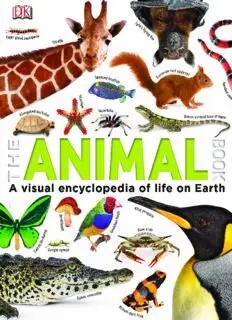
The Animal Book PDF
Preview The Animal Book
A visual encyclopedia of life on Earth LONDON, NEW YORK, MELBOURNE, MUNICH, AND DELHI DK LONDON Senior Editor Daniel Mills Senior Art Editor Vicky Short Jacket Designer Mark Cavanagh Pre-production Producer Lucy Sims Production Controller Alice Sykes Managing Editor Paula Regan Managing Art Editor Owen Peyton Jones Publisher Sarah Larter Art Director Phil Ormerod Associate Publishing Director Liz Wheeler Publishing Director Jonathan Metcalf DK DELHI Senior Editor Alka Ranjan Senior Art Editor Mahua Sharma Editors Susmita Dey, Neha Pande Art Editors Sanjay Chauhan, Rakesh Khundongbam, Vaibhav Rastogi Senior DTP Designer Harish Aggarwal DTP Designer Arvind Kumar Picture Researcher Ashwin Raju Adimari Managing Editor Rohan Sinha Deputy Managing Art Editor Sudakshina Basu Pre-production Manager Balwant Singh Production Manager Pankaj Sharma Picture Research Manager Taiyaba Khatoon First published in the Great Britain by Dorling Kindersley Limited 80 Strand, London WC2R ORL Penguin Group (UK) 2 4 6 8 10 9 7 5 3 1 001—184809—09/13 Copyright © 2013 Dorling Kindersley Limited All rights reserved No part of this publication may be reproduced, stored in a retrieval system, or transmitted in any form or by any means, electronic, mechanical, photocopying, recording, or otherwise, without prior written permission of the copyright owner. A CIP catalogue record for this book is available from AUTHOR the British Library. David Burnie is a fellow of the Zoological Society ISBN: 978-1-4093-2349-5 of London, and has written and contributed to Printed and bound in China by South China Printing Co. more than 100 books on the natural world. He was consultant editor of DK’s highly successful Animal and The Natural History Book, and is a former winner Discover more at www.dk.com of the Aventis Prize for Science Books. Foreword 8 Tree of life 10 Microscopic life 12 Bacteria 14 Single-celled life 16 Zooplankton 18 Seaweeds 20 Fungi 22 Mushrooms 24 Sac fungi and lichens 26 Cup fungi 28 Plants 30 Liverworts and mosses 32 Ferns 34 Conifers 36 Flowering plants 38 Venus flytrap 42 Broadleaved trees 44 Invertebrates 48 Sponges 50 Starfish, urchins, and sea cucumbers 66 Jellyfish, anemones, and corals 52 Centipedes and millipedes 68 Pacific sea nettle 54 Spiders and relatives 70 Worms 56 Sea spider 74 Molluscs 58 Crustaceans 76 Giant clam 62 Squid, octopuses, and cuttlefish 64 Insects 80 Dragonflies and Beetles 92 damselflies 82 Butterflies and moths 94 Stick insect 84 Slug moth caterpillar 98 Crickets and grasshoppers 86 Flies 100 True bugs and treehoppers 88 Bees, wasps, and ants 102 Praying mantis 90 Fish 104 Sharks, rays, and skates 106 Whale shark 110 Saltwater fish 112 Black-striped salema 118 Deep-sea fish 120 Freshwater fish 122 Amphibians 126 Frogs and toads 128 Tree frogs 134 Salamanders and newts 136 Reptiles 138 Turtles and tortoises 140 Lizards 144 Komodo dragon 148 Snakes 150 African bush viper 154 Crocodiles and alligators 156 Birds 158 Ostriches and relatives 160 King vulture 186 Gamebirds 162 Ducks, geese, and swans 188 Pigeons and doves 164 Penguins 190 Parrots and cockatoos 166 Emperor penguins 192 Military macaw 168 Storks, ibises, and herons 194 Cuckoos and turacos 170 Pelicans and relatives 196 Owls 172 Flamingos 198 Barred owl 174 Cranes and relatives 200 Hummingbirds and swifts 176 Waders, gulls, and auks 202 Kingfishers and relatives 178 Albatrosses 206 Toucans and Perching birds 208 woodpeckers 180 Red-backed shrike 214 Birds of prey 182 Mammals 216 Mammals with pouches 218 Polar bear 254 Cows, antelope, and sheep 276 Armadillos, sloths, Seals and walrus 256 and anteaters 222 Hippopotamuses 280 Cats 258 Hedgehogs and moles 224 Pigs, peccaries, Lions 262 and deer 282 African elephants 226 Otters, raccoons, Camels, llamas, Rabbits, hares, and pikas 228 and weasels 264 and giraffes 284 Rodents 230 Mongooses, civets, Giraffes 286 and genets 266 Bushbabies, lemurs, Dolphins and porpoises 288 and tarsiers 234 Meerkats 268 Whales 290 Gibbons, apes, Rhinos and tapirs 270 and humans 236 Humpback whale 292 Horses and relatives 272 Orang-utans 238 Plains zebras 274 New World monkeys 240 Old World monkeys 242 Bats 244 Honduran white bats 248 Dogs, foxes, and relatives 250 Bears 252 Index 294 Fly agaric m e lily a l F s f a e calis u c c o c o n ter E Foreword Life on Earth is incredibly varied, and more species are discovered every year. Researchers This book is the ultimate guide to all kinds of have so far identified about 100,000 kinds of living things. In it you can find out how different fungus, 300,000 kinds of plant, and an amazing creatures look, how they work, and how they 2 million kinds of animal. But even more species behave, from bacteria to bugs, worms to whales. are waiting to be found, particularly in remote If you’re already a budding naturalist, you’ll places such as mountain rainforests and deep know that scientists divide the living world into seabed mud. The total number of species could groups. Each group has special features that set it be as high as 20 million, with insects topping the apart. For example, insects are the only animals list as the most successful animals of all time. with six legs and wings, while mammals are the Some species are good at surviving in today’s only animals that produce milk, and the only world, but unluckily many are not. They are ones with fur. This book is divided in the same harmed by hunting, pollution, and deforestation, way. In each group you’ll find lots of different or by changes in their habitats as wild places are species, or individual kinds of living things. taken over by humans. Some of the world’s most Tigers, golden eagles, and daisies are all vulnerable animals have already become extinct, examples of species. So are humans, too. and many more are in danger of joining them. Porcupi n efi s h d a o t e n a C
